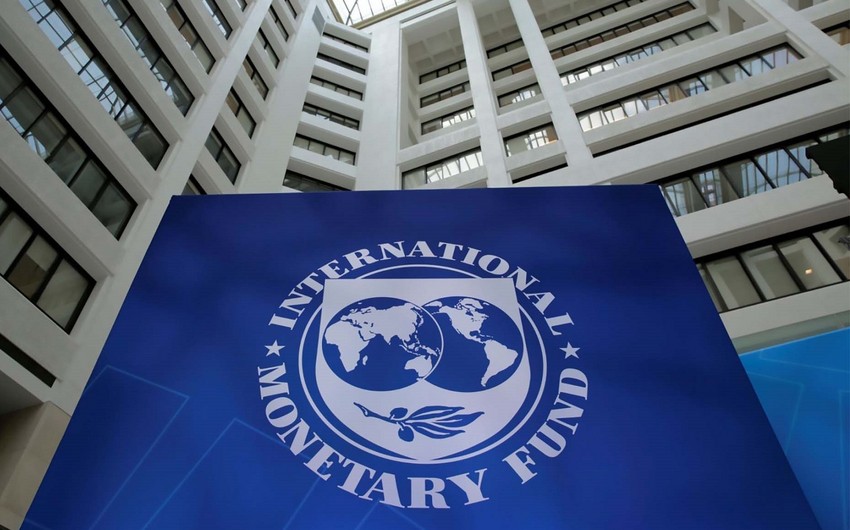The International Monetary Fund (IMF) forecasts Azerbaijan's nominal GDP growth from $72.4 billion in 2023 to $75.6 billion in 2024 and $77 billion in 2025, reads the IMF's new report "Regional Economic Outlook: Middle East and Central Asia," titled "Navigating the Changing Geoeconomic Landscape," Report informs.
Azerbaijan's real GDP growth is projected at 3.2% in 2024, up from 1.1% in 2023, but will decrease to 2.5% in 2025. Non-oil sector growth is expected at 4.8% in 2024 and 3.8% in 2025 (compared to 3.7% in 2023). The oil GDP decline will reduce from 4.2% in 2023 to 0.5% in 2024-2025. Growth among oil exporters in the Caucasus and Central Asia (CCA) is expected to slow from 3.9% in 2023 to 3.3% in 2024 due to stalled oil production growth in Kazakhstan. In 2025, a temporary increase in GDP growth to 3.9% will be linked to the expansion of Kazakhstan's Tengiz oil field.
In the medium term, hydrocarbon production is forecast to stabilize, limited by production capacity without significant investments in Azerbaijan and Turkmenistan. The IMF emphasizes that declining global oil and gas prices have increased the role of the non-energy sector in economic growth among the region's oil exporters, such as Azerbaijan and Kazakhstan.
Strong domestic demand, characterized by still-high consumer lending and strong business lending growth in Azerbaijan and Kazakhstan, was accompanied by active economic activity in construction and service sectors. In Azerbaijan, this sector received significant momentum from public and private investments in 2024. The country's inflation slowdown allowed for monetary policy easing and a 75 basis point reduction in the key interest rate. Average annual inflation in Azerbaijan is expected at 2.1% in 2024 and 4.8% in 2025, down from 8.8% in 2023.
"According to global trends, overall core inflation among CCA oil-exporting countries is projected to decrease from 7% in 2024 to 5.2% in the medium term. In Azerbaijan, inflation significantly weakened in early 2024 due to reduced imported inflation effects. In Kazakhstan, inflationary pressure remains high due to utility tariff increases and currency depreciation. Kazakhstan's Central Bank has signaled possible maintenance of current interest rates until year-end. In Turkmenistan, conversely, loose monetary policy and annual 10% increases in government salaries and pensions have contributed to inflation growth," the IMF emphasizes.
According to the Fund, foreign trade with Russia among oil exporters decreased in the first quarter of 2024: exports to Russia from Kazakhstan fell by 20%, and from Azerbaijan by 10%. Meanwhile, overall export and import volumes also declined, leading to deteriorating external positions amid falling oil and gas prices. The Currency Fund expects narrowing external balances among oil exporters due to falling energy prices, with the average current account maintaining a surplus of 0.8% of GDP this year before moving into deficit in the medium term.
However, this forecast represents a 1.5 percentage point GDP increase compared to April, reflecting higher oil revenues and lower dividend repatriation in Kazakhstan. Going forward, current account balances are expected to worsen for all oil and gas exporters, especially in Azerbaijan and Turkmenistan, due to lower hydrocarbon prices, overvalued currency in Turkmenistan, and industrial goods import growth outpacing oil exports in Kazakhstan.
"Despite this, public debt remains at or below 20% of GDP, indicating a stable fiscal position for these countries," the report states. Azerbaijan's public debt-to-GDP ratio is projected at 20.5% in 2024 and 20.3% in 2025.
According to the report's authors, declining hydrocarbon revenues intensify fiscal challenges, particularly in Azerbaijan and Kazakhstan. Although both countries are implementing measures to mitigate the impact of declining hydrocarbon revenues (such as reducing tax benefits in Azerbaijan and Kazakhstan and increasing corporate tax rates in Kazakhstan), these measures are insufficient to prevent public debt growth (particularly in Kazakhstan).
Nevertheless, public sector debt levels are projected to remain contained at or below 27% of GDP during the forecast period.


 https://static.report.az/photo/5f95c82d-0314-337d-af3f-6a3466e0ed4b.jpeg
https://static.report.az/photo/5f95c82d-0314-337d-af3f-6a3466e0ed4b.jpeg

